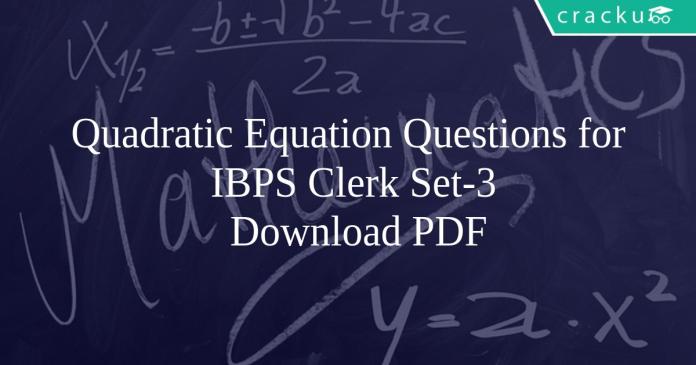Quadratic Equation Questions for IBPS Clerk Set-3 PDF
Download important Quadratic Equation Questions set-3 PDF based on previously asked questions in IBPS Clerk and other Banking Exams. Practice Scheduling Questions and Answers for IBPS Clerk Exam.
Download Quadratic Equation Questions for IBPS Clerk Set-3 PDF
Get 25 IBPS Clerk mocks for Rs. 149. Enroll here
Take Free IBPS Clerk Mock Test
Download IBPS Clerk Previous papers PDF
Instructions
<p “=””>In these questions two equations numbered I and II are given. You have to solve both the equations and give answer
a: if x < y
b: if x > y
c: if x = y
d: if x = y
e: if x= y or relationship between x and y cannot be established
Question 1: I. $3x^{2} + 23x+ 44 = 0$
II. $3y^{2} + 20y + 33 = 0$
a) if x < y
b) if x > y
c) if x => y
d) if x <= y
e) if x= y or relationship between x and y cannot be established
Question 2: I. $4x^{2} – 29x + 45 = 0$
II. $3y^{2} – 19y + 28 = 0$
a) if x < y
b) if x > y
c) if x => y
d) if x <= y
e) if x= y or relationship between x and y cannot be established
Question 3: I. $2x^{2} – 13x + 21 = 0$
II. $5y^{2} – 22y + 21 =0$
a) if x < y
b) if x > y
c) if x => y
d) if x <= y
e) if x= y or relationship between x and y cannot be established
Go to Free Banking Study Material (15,000 Solved Questions)
Instructions
In these questions, two equations numbered I and II are given. You have to solve both the equations and mark the appropriate answer. Give answer :
a:If x < y
b: If x > y
c: If x ≤ y
d: If x ≥ y
e: If relationship between x and y cannot be determined ,
Question 4: I. $15x^{2} + 26x + 8 = 0$
II. $25y^{2} + 15y + 2 = 0$
a) If x < y
b) If x > y
c) If x ≤ y
d) If x ≥ y
e) If relationship between x and y cannot be determined
Question 5: I. $10x^{2} + 21x + 8 = 0$
II. $5y^{2} + 19y + 18 = 0$
a) If x < y
b) If x > y
c) If x ≤ y
d) If x ≥ y
e) If relationship between x and y cannot be determined
Instructions
In the given questions, two quantities are given, one as Quantity I and another as Quantity II. You have to determine relationship between two quantities and choose the appropriate option.
a: If quantity I ≥ quantity II
b: If quantity I > quantity II
c: If quantity I < quantity II
d: If quantity I = quantity II or the relationship cannot be established from the information that is given
e: If quantity quantity II
Question 6: Ram invested P in scheme A and 2P in scheme B, for two years each. Scheme A offers simple interest p.a. Scheme B offers compound interest (compounded annually) at the rate of 10% p.a. Respective ratio between the interest earned from scheme A and that earned from scheme B was 8 : 21.
Quantity :
I. Rate of interest offered by scheme A.
II. Rate of interest offered by scheme C (simple interest p.a.), when 1,600/- is invested for 3 years earns an interest of 384/-.
a) If quantity I ≥ quantity II
b) If quantity I > quantity II
c) If quantity I < quantity II
d) If quantity I = quantity II or the relationship cannot be established from the information that is given
e) If quantity quantity II
IBPS Clerk Important Questions PDF
Instructions
<p “=””>In these questions two equations numbered I and II are given. You have to solve both the equations and give answer
a: if x < y
b: if x > y
c: if x = y
d: if x = y
e: if x= y or relationship between x and y cannot be established
Question 7: I. $3x^{2}+ 29x + 56 = 0$
II. $2y^{2} + 15y + 25 = 0$
a) if x < y
b) if x > y
c) if x => y
d) if x <= y
e) if x= y or relationship between x and y cannot be established
Instructions
In each of these questions an equation is given with a question mark (?) in place of the correct figure on the right hand side which satisfies the equality. Based on the values on the left hand side and the symbol of equality given, you have to decide which of the following figures will satisfy the equality and thus come in place of the question mark.
Symbols and Stand for
> greater than
= equal to
< lesser than
$\geq$ either greater than or equal to
$\leq$ either lesser than or equal to
Question 8: $\pm [(35 \div 2) – (43.5 \div 3)] \leq ?$
a) – 3
b) 9
c) $\sqrt{9}$
d) 3
e) ± 3
Question 9: $[175-(52 – 72)] \geq ?$
a) +195
b) -195
c) 195
d) 196
e) $\sqrt{195}$
Question 10: $-((\sqrt{225}-\sqrt{144})\times-(1.5))=?$
a) 4.5
b) – 4.5
c) 5.4
d) – 5.4
e) 4.8
Free Banking Study Material (15,000 Solved Questions)
Download IBPS Clerk Previous papers PDF
Answers & Solutions:
1) Answer (D)
$3x^{2} + 23x + 44 = 0$.
$x=\frac{-23\pm\sqrt{23^{2}-4\times44\times3}}{2\times3}$
$x=\frac{-23\pm1}{6}$.
$x=\frac{-11}{3},-4$.
$3y^{2} + 20y + 33 =0$.
$y=\frac{-20\pm\sqrt{20^{2}-4\times33\times3}}{2\times3}$.
$y=\frac{-20\pm2}{6}$.
$y=-3,\frac{(-11)}{3}$.
Clearly,
x <= y
Hence, Option D is correct.
2) Answer (E)
$4x^{2} – 29x + 45 = 0$.
$x=\frac{29\pm\sqrt{29^{2}-4\times45\times4}}{2\times4}$
$x=\frac{29\pm3}{8}$.
$x=\frac{13}{4},4$.
$3y^{2} – 19y + 28 =0$.
$y=\frac{19\pm\sqrt{19^{2}-4\times28\times3}}{2\times3}$.
$y=\frac{19\pm5}{6}$.
$y=4,\frac{7}{3}$.
Clearly,
if x= y or relationship between x and y cannot be established
Hence, Option E is correct.
3) Answer (C)
$2x^{2} – 13x + 21 = 0$.
$x=\frac{13\pm\sqrt{13^{2}-4\times21\times2}}{2\times2}$
$x=\frac{13\pm1}{4}$.
$x=\frac{7}{2},3$.
$5y^{2} – 22y + 21 =0$.
$y=\frac{22\pm\sqrt{22^{2}-4\times21\times5}}{2\times5}$
$y=\frac{22\pm8}{10}$.
$y=3,\frac{7}{5}$.
Clearly,
x => y
Hence, Option C is correct.
4) Answer (C)
I. $15x^{2} + 26x + 8 = 0$
=> $15x^2 + 6x + 20x + 8 = 0$
=> $(3x + 4) (5x + 2) = 0$
=> $x = \frac{-4}{3} , \frac{-2}{5}$
II. $25y^{2} + 15y + 2 = 0$
=> $25y^2 + 5y + 10y + 2 = 0$
=> $(5y + 2) (5y + 1) = 0$
=> $y = \frac{-2}{5} , \frac{-1}{5}$
$\therefore x \leq y$
5) Answer (B)
I. $10x^{2} + 21x + 8 = 0$
=> $10x^2 + 5x + 16x + 8 = 0$
=> $(5x + 8) (2x + 1) = 0$
=> $x = \frac{-8}{5} , \frac{-1}{2}$
II. $5y^{2} + 19y + 18 = 0$
=> $5y^2 + 10y + 9y + 18 = 0$
=> $(5y + 9) (y + 2) = 0$
=> $y = \frac{-9}{5} , -2$
$\therefore x > y$
6) Answer (D)
$S.I. = \frac{P \times R \times T}{100}$
$C.I. = P [(1 + \frac{R}{100})^T – 1]$
Rate of interest for scheme B = 10 %
Time period in each scheme = 2 years
Acc to ques,
=> $\frac{\frac{P \times R \times 2}{100}}{2P [(1 + \frac{10}{100})^2 – 1]} = \frac{8}{21}$
=> $\frac{\frac{R}{50}}{\frac{21}{50}} = \frac{8}{21}$
=> $\frac{R}{21} = \frac{8}{21}$
=> $R = 8 \%$
Quantity I = 8 %
Quantity II : $384 = \frac{1600 \times R \times 3}{100}$
=> $R = \frac{384}{48} = 8 \%$
$\therefore$ Quantity I = Quantity II
7) Answer (A)
$3x^{2} + 29x + 56 = 0$.
$x=\frac{-29\pm\sqrt{29^{2}-4\times56\times3}}{2\times3}$
$x=\frac{-29\pm13}{6}$.
$x=\frac{-8}{3},-7$.
$2y^{2} + 15y + 25 =0$.
$y=\frac{-15\pm\sqrt{15^{2}-4\times25\times2}}{2\times2}$.
$y=\frac{-15\pm5}{4}$.
$y=-5,\frac{(-5)}{2}$.
Clearly,
x < y
Hence, Option A is correct.
8) Answer (C)
$\pm [(35 \div 2) – (43.5 \div 3)] $
= ± [17.5-14.5]
= ± 3
Since ± 3 $\leq $ 3
9) Answer (A)
[175-(52 – 72)]
= 175 +20
= 195
10) Answer (A)
$-((\sqrt{225}-\sqrt{144})\times-(1.5))=?$
= – (15-12) $ \times $ (-1.5)
= (-3)$ \times $(-1.5) =4.5
Highly Rated Free Preparation App for Banking Exams
We hope this Quadratic Equation Questions and answers for IBPS Clerk preparation will be helpful to you.





![How To Manage Time In CAT Exam? [Section-wise Tips] How to manage time in CAT exam ?](https://cracku.in/blog/wp-content/uploads/2018/09/fig-03-09-2018_10-54-46-218x150.jpg)